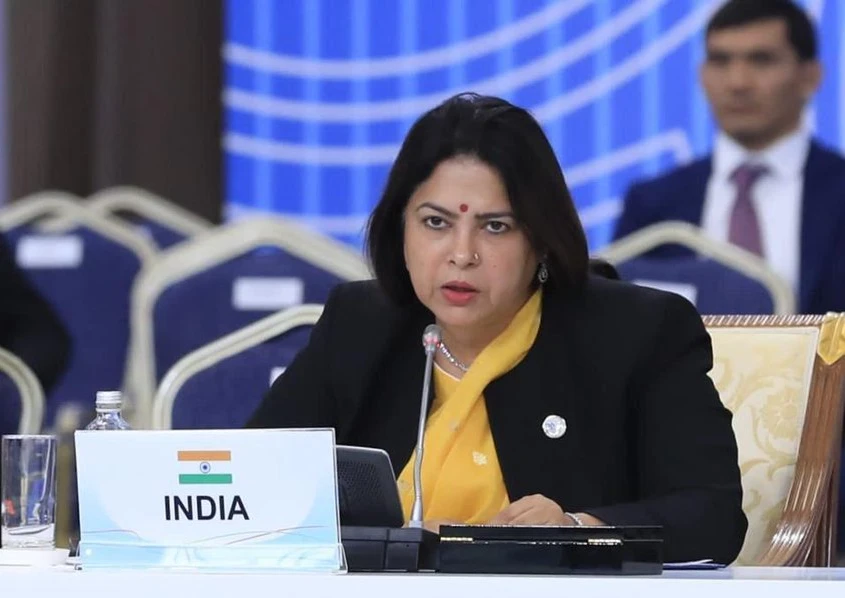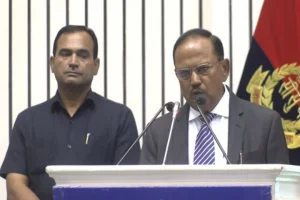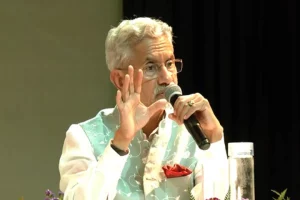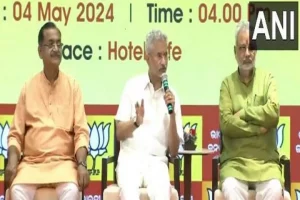The sixth two-day Summit of the Conference on Interaction and Confidence Building Measures in Asia (CICA) ended in Astana, the capital of Kazakhstan on October 13. The CICA meeting witnessed the presence of 11 heads of state, including presidents of Azerbaijan, Belarus (observer), Iran, Kazakhstan (host), Kyrgyzstan, the State of Palestine, Russia, Tajikistan, Turkey, and Uzbekistan, as well as the Emir of Qatar. Vice-Presidents of China and Vietnam also participated in the summit. Overall, 50 delegations including several Ministers participated in the Summit. Meenakshi Lekhi, Minister of State for External Affairs represented India at the Summit.
Background
CICA is a multi-national forum for enhancing cooperation to promote peace, security and stability in Asia. It is a forum based on the recognition that there is a close link between peace, security and stability in Asia and in the rest of the world. The Member States, while affirming their commitment to the UN Charter, believe that peace and security in Asia can be achieved through dialogue and cooperation leading to a common indivisible area of security in Asia where all states co-exist peacefully and their peoples live in peace, freedom and prosperity. At present, CICA has 27 member states accounting for nearly 90 percent of the territory and population of Asia. Nine countries and five multi-national organizations, including the United Nations, have observer status. The procedure to accept Kuwait as a new member was kick-started at the Astana Summit.
The idea of convening CICA was first proposed by former Kazakh President Nursultan Nazarbayev, on 5 October 1992, at the 47th Session of the United Nations General Assembly. The initiative was motivated by the aspiration to set up a structure for ensuring peace and security in Asia. This initiative was supported by a number of Asian countries who felt that such a structure was the need of the time.
The two founding documents of CICA are Declaration on the Principles Guiding Relations between the CICA Member States adopted at the First Meeting of Ministers of Foreign Affairs held in Almaty on 14 September 1999 and the Almaty Act, charter of CICA, adopted at the First Summit held in Almaty on 4 June 2002.
Creating an environment of confidence among Member States is central to the basic objectives of CICA. The CICA Catalogue of Confidence Building Measures describes various measures in this regard. Within this framework, CBMs are categorized under five broad domains: economic dimension, environmental dimension, human dimension, new challenges and threats, and military-political dimension.
The CICA Secretariat is headquartered in Astana, Kazakhstan. The Secretariat consists of the Executive Director (designation changed to Secretary-General at the recent Summit) nominated by the Chairing country. This position is currently occupied by the eminent and highly respected Kazakh diplomat Ambassador Kairat Sarybay.
The Summit
In his opening address, Kazakh President Kassym-Jomart Tokayev called for a fresh impetus to multilateral mechanisms and a return to open dialogue. He said “the most important task” now is to achieve stability in international relations in the face of great threats.
In his video address to the CICA summit, United Nations Secretary-General Antonio Guterres stated, “I am grateful for our partnership in pursuit of our shared goals: advancing sustainable development.” He further said that over the last 30 years, CICA has grown into a vital platform for dialogue between countries across Asia.
The most significant outcome of the Summit was the adoption of the Astana Declaration on CICA Transformation from a conference into a full-fledged organization at the plenary session on 13th October. According to Executive-Director/Secretary-General Sarybay: ‘’This means that a structured, inclusive, and open negotiation process of gradual and consensual transformation of CICA into a full-fledged regional international organization has begun.’’ This milestone decision has been a key priority of Kazakhstan’s CICA chairpersonship in 2020-2022. The importance of this transformation was first emphasized by President Tokayev in October 2021 during his meeting with the CICA foreign ministers. He said back then that CICA possessed all the elements of an international organization, including fundamental documents, governing and working bodies, an operating budget, a permanent secretariat, and its transformation will “emphasize Asia’s new role in global affairs.”
The summit also adopted a draft statement on Cooperation in Security of and in the Use of Information and Communication Technologies, a document to establish the CICA Fund, and a Plan to Implement the United Nations Global Counter-Terrorism Strategy.
India’s Participation
In her plenary Statement, Meenakshi Lekhi, MOS(EA) said that CICA’s ethos is in consonance with India’s support for inclusive, consultative and cooperative multilateralism and our fundamental philosophy of Vasudhaiva Kutumbakam, which means the world is one family. This guides India’s foreign policy in general and, in even greater measure, in relations with Asia. She added that this belief was evident during the Covid pandemic when ‘’while providing for our own people, India did not abdicate its responsibility towards the humanity at large’’ and ‘’provided vaccines, medicines and medical supplies, as well as expertise to more than 150 nations.’’
Lekhi recounted India’s achievements in promoting the SDGs through its flagship initiatives such as International Solar Alliance (ISA) and Coalition for Disaster Resilient Infrastructure (CDRI); digitalization among others. In addition, she conveyed India’s resolute position in the fight against terror.
Prior to India’s Statement, Pakistan Prime Minister Shehbaz Sharif accused India of committing atrocities in Jammu and Kashmir, claiming the onus was on New Delhi to engage with Pakistan in a result-oriented manner. Reacting strongly to Pakistan’s statement, Lekhi urged Islamabad to immediately end cross-border terrorism to create the conditions for dialogue. She arraigned Pakistan for once again using the CICA platform to “promote false and malicious propaganda” against India and to divert attention away from the grouping’s discussions. She charged that Sharif’s remarks amounted to “gross interference in India’s internal affairs, sovereignty and territorial integrity” and were inconsistent with CICA’s principles guiding relations between member states. She termed Pakistan as the global epicenter of terrorism and advised it ‘’to walk the talk by creating a conducive atmosphere, including by taking credible, verifiable and irreversible actions to not allow any territory under its control to be used for cross-border terrorism against India.’’
In her comprehensive Statement, Lekhi identified CICA as ‘’an important platform to promote multilateralism in diverse and multi-polar Asia.’’ She recalled the statement of India’s then PM Atal Bihari Vajpayee during his participation in the first CICA Summit in Almaty in 2002 that ‘’in our tendency to focus on the conflicts of the day, we should not forget or belittle our shared past.”
Conclusion
In the 6th Summit held to mark the 30th anniversary of establishment of CICA, several far-reaching and significant decisions were taken, the most important being to ‘’ launch structured, inclusive and transparent negotiations for a process of gradual, incremental and consensus-based transformation of CICA into a full-fledged regional international organization.’’ This transformation will enable CICA to play a more decisive and forceful role in promoting peace, security and stability in Asia than it has been able to do thus far. Several new names for this body have been suggested which would mark the metamorphosis of this platform from a Conference to a full-fledged global organization.
The ‘’Chairman’s Conclusions on Achievements and Discussions of the Sixth Summit’’ do not make a very impressive or pleasant reading. It unfortunately lacks focus and direction. It is a potpourri of disparate thoughts, positions and views of different countries on a variety of issues with little coherence. Possibly nothing different could have been expected because of the nature of the Organization that has existed till date. It can be hoped that going forward the new Organization will be able to make a useful contribution to promoting understanding and cooperation between countries in Asia.
CICA is senior, both in terms of the years that it has been in existence and also the membership of the body, as compared to the Shanghai Cooperation Organization, the other regional body active in the fields of security, economy, connectivity, counter-terror etc. It is evident that CICA has some catching up to do with its younger sibling. It is hoped that the changes mooted in the body at the Astana Summit will make it a more credible and effective Organization.
Going forward, it would need to be ensured that bilateral issues are kept strictly out of the remit of the body. It has been observed that Pakistan is a serial offender in this respect. It is absolutely imperative to rein in such tendencies by Pakistan or any other country. Actions like this speak ill of the integrity and reliability of the erring country, and also diminish the credibility and dignity of the platform on which they speak.
Notwithstanding the shortcomings cited above, the new organization is expected to be better suited to making a vital and critical contribution to ensuring peace, security, stability and prosperity in Asia and the world.
Also Read: Is Central Asia Distancing Itself from Russia?
(Ashok Sajjanhar is a former Ambassador of India to Kazakhstan, Sweden and Latvia. He is an Executive Council Member at the Manohar Parrikar Institute for Defence Studies and Analysis and President, Institute of Global Studies. Views expressed are personal and exclusive to India Narrative)


















